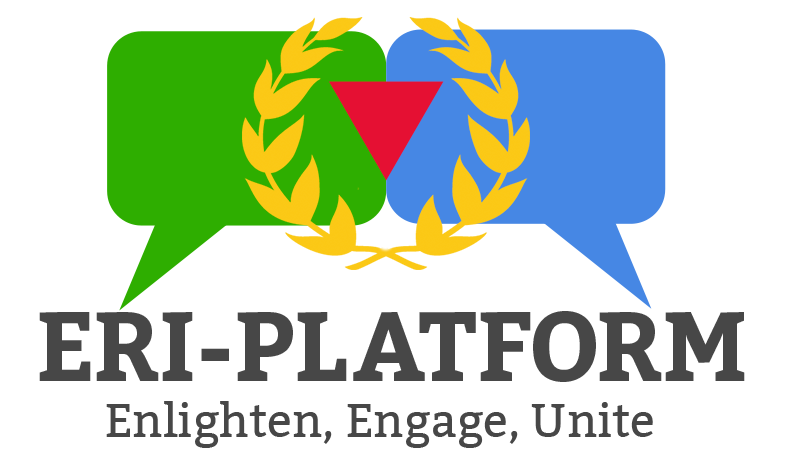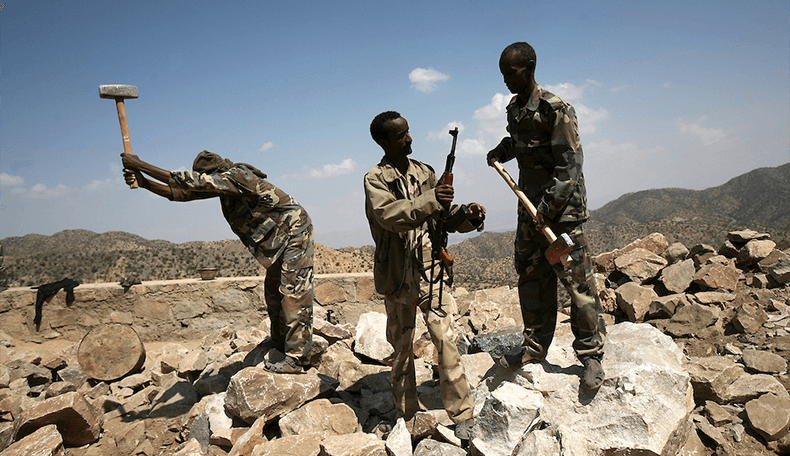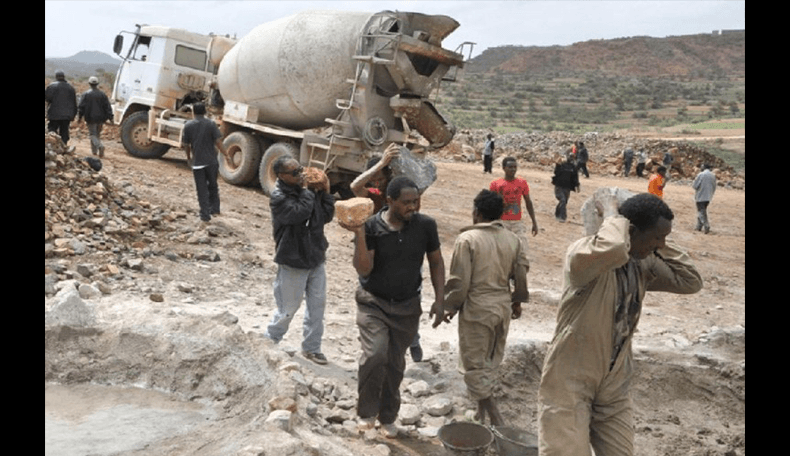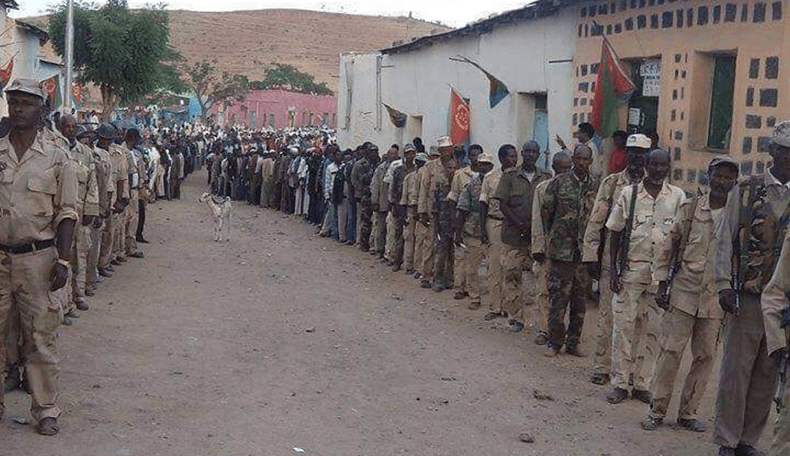The Securitisation of Eritrea: Holding a Nation Hostage!
The birth of an independent sovereign State of Eritrea crowning a thirty-year war of national liberation represented a brilliant victory achieved at the expense of (1) a protracted, difficult and arduous armed struggle; (2) a huge sacrifice of the finest of Eritrea’s youth; (3) an extensive destruction of Eritrea’s national economy; (4) a heavy damage to the standard of living of the Eritrean people; and (5) a massive disruption of the family life and social fabric of Eritrean society. Following independence, however, the Eritrean people have, unfortunately, been unable to establish a democratic system of government that vindicates their sacrifices and fulfils their age-old aspirations for peace, justice, development and prosperity.
The authoritarian regime’s betrayal of the fundamental objectives of the armed struggle and the profound aspirations of the Eritrean people for freedom has brought about the wretched misery afflicting the people and the country. Twenty-seven years post-independence, Eritrea should have been a country of choice for its people, availing them a higher standard of living, a better quality of life and normal human security.
Whereas the government has failed to provide for the basic necessities of the people, let alone fulfil these lofty expectations, it continues to ride roughshod over the country. There is a need to understand how the regime has succeeded in its nefarious undertakings, with a strategic narrative that has been able to hold an entire nation hostage for so long. The process of securitisation provides a lens through which to view and better comprehend the chain of events that have led to Eritrea’s current predicament.
Securitisation is the (1) identification and labelling by a State or political actor, of (2) an issue that is perceived as a severe or imminent threat, that (3) requires extraordinary means to neutralise the threat and (4) ensure survival. The extraordinary measures that are employed to respond to this threat need no longer follow the normal institutional and democratic chain of decision- or policy-making due to the severity of the circumstances. For instance, the imposition of de facto military rule in the context of an extended state of emergency, albeit undeclared.
Successful securitisation is dependent on three key factors:
1. The persuasive ability (narrative) to frame the situation and convince the audience (population) of an existential threat.
2. The acceptance by the population of the narrative irrespective of whether the threat is real or not.
3. The use of the state security apparatus and other government institutions to coerce general compliance with the narrative.
In the case of Eritrea, it fought a three-decade long war of independence, 1961-1991, against a third world coloniser and larger neighbour, Ethiopia, followed by a border war from 1998 to 2000. The border war cost US$ 580 million, approximately 90% of Eritrea’s GDP in 1999, further devastating an already weak economy, spilling fresh blood from wounds barely healed and displacing hundreds of thousands of people. Ultimately, the border war resulted in the occupation of large swathes of Eritrean territory by Ethiopian forces, continuing to date.
Ethiopia’s occupation of sovereign Eritrean territory, and persistent refusal to withdraw, feeds into and reinforces the ‘official’ narrative constructed by the regime around the imminent and existential threat posed by Ethiopia to Eritrea’s sovereignty, territorial integrity and security. Essentially, this is utilising a ready-made security threat at Eritrea’s doorstep that requires little effort with which to convince or justify the need to use extraordinary measures. The protracted nature of the armed struggle for liberation, extending over thirty years, involved generations of Eritreans, men and women, all of whom have made enormous sacrifices and suffered terrible losses in the name of freedom and self-determination. Given the revolutionary ethos associated with the war of national liberation and the high price paid for independence, Eritrea’s sovereignty and territorial integrity must therefore be defended - whatever the cost.
Consequently, the territorial occupation, together with the frozen state of play of no war, no peace, provided the necessary context from which to begin implementing a series of changes that fundamentally altered Eritrea’s social, economic and political fabric. The most destructive of which is the de facto rendering of compulsory active national service indefinite, under the pretext of maintaining a standing army able to confront any and all external (especially Ethiopian) aggression. Eritrean youth are disproportionately affected by being robbed of entitlement to normal family upbringing and the opportunity for higher education or gainful employment in the labour market, which itself has been considerably downsized, heavily regulated and tightly controlled.
As a consequence, the economic toll of the mismanagement of Eritrea’s most valuable resource (youth) has contributed to the reversal of the promising developmental progress achieved during the first few years of independence, setting the country on a perpetual trajectory of regression. Initially conceived as an eighteen-month period of service, comprising six months of military training and twelve months of voluntary work, with the objective to help rebuild Eritrea’s ruined infrastructure and to jumpstart the economy following the devastation of the protracted armed struggle for liberation. It was intended to avail the new nation, which neither needed nor could afford to maintain a large standing army, with a credible defence capability, along the lines of the Swiss model, in case of need in a highly volatile region riven by chronic interstate and intrastate conflict.
The regime has perverted the system of national service to serve its own interests by concentrating control structures, disrupting the formal chain of command, advancing societal surveillance, instituting the regimentation of the entire population, and fostering an atmosphere of suspicion and fear. Embedded within the strict regimentation of the coupon rationing system, the initiation of youth for national service begins on the verge of their coming of age, via the militarisation of education with the advent of the last year of high school. Once recruited, the youth are then scattered to different corners of the country for service of unlimited duration with limited contact with family and relations, required to give service and loyalty only to the regime, in the name of Eritrea. Indefinite active national service without due remuneration disables the youth from having or sustaining their own families. The disruption of the nuclear family undermines the very foundations of the community and the nation.
Eritrea’s coupon economy, designed to serve mainly as a source of communal surveillance and an instrument of political control, rations basic necessities, such as food and fuel. The chronic shortage of essential goods and services afflicting the people is essentially man-made. It is the outcome of a mismanaged national economy, a distorted domestic market and a neglected agricultural sector, the mainstay of the economy. Recurrent droughts, crop failures and poor harvests exacerbate the consequences of the regime’s misguided and erratic economic diktat.
The incumbent regime used the frozen state of no war, no peace in the wake of the border war to systematically centralise the overall chain of command to the highest degree under the President by suspending all on-going policy, legislative and institutional processes needed to complete Eritrea’s democratic transition following independence. The suspension of the Eritrean National Assembly and the failure to apply the 1997 ratified Constitution and hold free and fair elections are examples of how democracy and democratisation are the first causalities in the process securitisation.
As a new nation, Eritrea lacked the bureaucratic and institutional capacity conducive to democratic compliance and accountability with which to challenge these unilateral decisions centralising power. Consequently, the private press was dismantled, and dissenting senior military officers and high government officials, dissident junior officers and officials, critical rank and file members, and journalists were arbitrarily arrested and detained without due process on baseless allegations of treachery and sedition. In the 2001 crackdown, those with moral authority, divergent views, and the capacity to counter any decisions or expose a one-sided ‘official’ narrative, were among the first to be removed and silenced. All these concurrent measures were designed to consolidate presidential power.
Sustaining the suppression of dissenting voices by the regime has been facilitated by communal self-censorship fuelled by the fear of repercussions, such as detention and torture, with the ‘official’ narrative condemning any and all critics with divergent views or dissident opinion as Woyane (Ethiopian) or CIA (US Central Intelligence Agency) agents. This discourse of heavy securitisation of policies has engendered an extremely politicised perspective of seeing things in black and white that has become deeply ingrained or internalised among certain regime supporters and sympathisers, particularly in the Diaspora. Predictably, such a Manichean mind set allows no room for open discussion or civil dialogue, reducing complex situations into a binary view of survival, of them versus us.
Thus, encouraging attitudes and an atmosphere of aggression, hostility and suspicion affecting Eritreans at home and in the Diaspora, as evidenced on online social media platforms by supporters of the regime. The anonymity afforded by social media and instant transmission of information has aided the agenda of the regime. Images are regularly recirculated, especially on channels such as twitter, featuring black and white photos of heroic deeds and spectacular operations during the liberation war, the magnificent natural beauty of Eritrea’s landscapes, or carefully selected and manicured snapshots of urban areas, especially Asmera, with captions exalting successes and achievements, often linked to the regime.
A small army of online accounts, often anonymous, aim to cultivate and impose an image of a stable, peaceful and prosperous country reflecting the ‘official’ narrative and fabricated reality carefully crafted by the regime. Ironically, it is winning over and recruiting some Eritrean Diaspora youth online in support of the regime and its manicured image. This improbable success is attributed to the valuable sense of pride and belonging it cultivates among youth who often face alienation in their host countries and are otherwise presented with a counter narrative, by a ‘historically hostile’ international media, of a stark reality in direct juxtaposition. Examples of aggressive interactions and harangue on twitter are commonplace with attacks orchestrated on any and all tweets that are deemed critical of the incumbent regime or seek to highlight aspects of Eritrea’s economic suffocation, political paralysis, societal disruption or dismal human rights situation.
This problem of aggressive interaction within certain sectors of the Eritrean Diaspora community is due, in no small part, to the inability of many to distinguish between the State of Eritrea (ሃገረ ኤርትራ), the People of Eritrea (ህዝቢ ኤርትራ), and the Government of Eritrea (መንግስቲ ኤርትራ). The Government is merely the regime in power under the auspices of the People’s Front for Democracy and Justice (PFDJ) which, with most of the most prominent members of its long suspended central committee either in jail or in exile, has become practically defunct. Needless to say, the intrigue, complicity and duplicity rampant among certain senior military officers and high officials within the ranks of the regime stem from the impunity afforded to their wrongful actions, cementing their loyalty and support to the regime in exchange for continued protection, a mutually beneficial arrangement. There are also those who place blind, if misguided, loyalty to the PFDJ regime because of its predecessor’s, the Eritrean People’s Liberation Front (EPLF), past role in the liberation struggle, long bygone. Such a stance is puzzling, especially in the face of compelling evidence of the regime’s repeated mistreatment and betrayal of the Eritrean people and the subversion of the original objectives of the armed struggle: a free, democratic and prosperous Eritrea for our children and generations to come.
The combination of brutal coercion with the use of powerful and effective tools of censorship, disinformation and misinformation; the regulation and monitoring of internet; and the frequent blocking of social media work to supress and annihilate any and all counter narratives. Reality is depicted by the single ‘official’ narrative of the regime and shaped by its priorities, interests and perceived security threats. Any resistance, dissent or criticism is ruthlessly suppressed. All this operates to blur the lines between regime and State security.
In reality, there is a fundamental difference between the security of the State of Eritrea and the security of the regime. However, the distinction between State and regime security is purposefully blurred to resemble one and the same. The blurring is exploited to the hilt in the service of the regime’s self-preservation, thereby identifying the ‘threats’ and ‘risks’ to itself as security concerns for the State of Eritrea. Consequently, these threats must be dealt with swiftly and harshly, with impunity.
Located at the intersection of two volatile regions of the Horn of Africa and the South Arabian Peninsula, Eritrea is directly surrounded by neighbours deemed or rendered hostile, Djibouti, Ethiopia, Sudan and Yemen. Beyond its immediate neighbourhood, Eritrea today, just like during the period of its struggle for self-determination, faces international isolation. There is, however, a stark difference and an important distinction between the two situations. Eritrea’s isolation during the era of the political and armed struggle for self-determination was imposed by the international community while its current isolation is sponsored by its own government. Certainly, the main drivers of Eritrea’s present isolation are the domestic practices and foreign policy responses of the incumbent regime. A ‘fit for purpose’ strategic decision allows the regime to act as it sees fit, with no need for discussion, analysis, accountability or impact assessment. This arrangement has plunged internal Eritrean politics into chaos, with mindless policy reversals, harmful forfeitures and brutal repression while its foreign policy reflects a series of missed opportunities due to erratic decisions that foster a constant state of tension within the Eritrean body politic and in the country.
Regarding Eritrea’s isolation, the narrative spun and sold to its people does not, of course, reflect the reality or the regime’s implicit role. Instead, in drawing on historical memories of isolation and its re-emergence by design, the regime portrays international sanctions as unprovoked and unwarranted acts of aggression against Eritrea. There is, of course, a half-truth in this argument. From the point of view of justice and fairness in terms of the UN Charter and international customary law, the sanctions against Eritrea are, in reality, singular, unjustified and unwarranted, but certainly not unprovoked. Nevertheless, imposing sanctions on one country for refusing to acknowledge and address an open border dispute with a neighbour and unsubstantiated accusations of support for a terrorist group while failing to apply commensurate measures to another country that continues to openly defy international law, flout its treaty obligations, and flagrantly occupy a neighbour’s sovereign territory - is surely a double standard. It should also be noted that it is in an expedient display of quid pro quo with its hostile neighbours that the regime hosts and sponsors their political and armed opposition groups in the reciprocal pursuit of the misguided and myopic policy of “the enemy of an enemy is a friend” to the detriment of regional stability.
In any case, international sanctions have repeatedly been proven ineffective tools for deterrence with disproportionate burdens placed on the local population. Conversely, they serve a useful purpose for the regime in power as a scapegoat for the consequences of its political blunders and economic mismanagement. Chronic shortages of basic necessities and essential goods and services, lack of capital and foreign direct investment, which have stunted economic development and social progress, are therefore sold by the regime as consequences of hostile international sanctions and a threat to Eritrea’s security and prosperity.
Therefore, the people of Eritrea are called, via a repetitive narrative, to, once again, ‘unite’ and revert to an almost mythical ‘self-reliance’, compelled to exert considerable effort and make enormous sacrifices. Initially adopted during the liberation struggle out of necessity due to the lack of adequate international support, self-reliance was a guiding principle which, together with unwavering determination and solidarity under an overarching Eritrean national identity, helped achieve independence. In a misguided and deliberate distortion of the principle of self-reliance, national service recruits are deployed to work in infrastructure building or in the extractive industry, in the name of nation-building as a duty to country, without due or adequate remuneration that falls short of the minimum needed to pay for coupon rations. In this age of advanced industrial technology, the recruits are made to toil in never-ending and back-breaking manual jobs needlessly requiring hard intensive physical labour. A harrowing reality given the extremely lucrative extractive gold and potash industry! With no transparency or accountability in the country’s public finances, the revenue income of these mines is neither accounted for nor used for the benefit of the country or the people.
The harsh reality of this bleak system has spurred a mass exodus, especially of the youth, out of Eritrea: with so many people falling victim to human trafficking and slavery in North Africa; organ harvesting in the Sinai; death in the Sahara Desert; or drowning in the Mediterranean and Red Seas. A decision to brave such risks becomes a viable option only when the alternative is far worse. The substantial reports and mounting evidence from the sheer number of people fleeing Eritrea for reasons, such as persecution, torture and detention, are met with the denial, dismissal or shifting of blame to “others” by the regime and its supporters. The regime’s ‘official’ narrative consistently assigns blame for the lack of progress or the reality of immense suffering affecting Eritrea and its people to hostile external entities, such as the US, the UN or Woyane, that threaten Eritrea’s security. In the incessant scheme of externalising the causes of Eritrea’s predicament, the net of blame has been cast even wider as of January 2018 to include mothers and immediate family members of recruits as encouraging them to flee.
As a people, Eritreans, especially in
the Diaspora, need to find a way towards reconciliation and unity through open
dialogue. The combination of persistent externalisation and extreme
politicisation of Eritrea’s problems festered over decades, fed by the
unrelenting narrative of the regime, has produced a divided, fragmented and
polarised Diaspora, unable to coalesce and undertake concerted positive action,
to the delight of the incumbent regime. Even the smallest steps, taken through
more respectful interaction and civil dialogue, can help let go of old grudges
and heal old wounds. It is high time that we, as a people, recognise and begin
taking ownership of our situation to seize our future by building bridges and reconnecting
as a community based on a common understanding and shared values.




